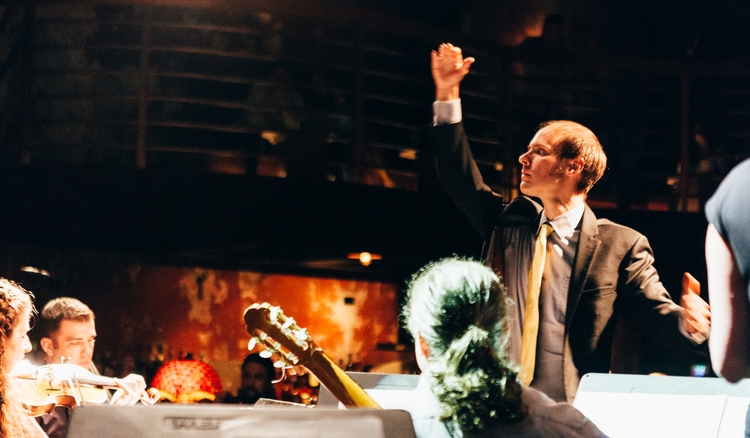 Michael Lewanski, an associate professor of instrumental ensembles in the School of Music, has conducted both nationally and internationally. Locally, he has guest-conducted ensembles from the Lyric Opera of Chicago, the Chicago Symphony Orchestra, the Civic Orchestra of Chicago and more. (Image courtesy of Marc Belanger)
Michael Lewanski, an associate professor of instrumental ensembles in the School of Music, has conducted both nationally and internationally. Locally, he has guest-conducted ensembles from the Lyric Opera of Chicago, the Chicago Symphony Orchestra, the Civic Orchestra of Chicago and more. (Image courtesy of Marc Belanger)
Three years into his conducting career, Michael Lewanski studied as a 16-year-old at Russia's St. Petersburg Conservatory, known for legendary alumni such as Tchaikovsky and Shostakovich. As an associate professor of instrumental ensembles, he now conducts the DePaul Concert Orchestra, DePaul's Ensemble 20+ and an internationally acclaimed new music group based in Chicago, Ensemble Dal Niente. Read on to learn how he teaches students to invite change in music, rethink the world around them and set the tone for culture to come.
How did studying at the St. Petersburg Conservatory influence your career?
The intense training and the way Russian culture relates to composers was certainly influential to my development and the direction of my career. In Russia, conducting classes were large group sessions for many hours a day, most days a week. That's a lot of hands-on time dedicated to practicing and thinking about music in new ways.
The integration and importance of classical music to Russian culture were also substantially stronger. If you think of famous American composers, Aaron Copland or George Gershwin come to mind, but they still didn't have the status in American culture like Dmitri Shostakovich had in Russian culture, at least when I lived there. Everyone on the street knew who he was.
How do you approach teaching the next generation of professional musicians?
We often assume cultural institutions - symphony orchestras, museums - are not changeable. It's an easy mistake to make because they have fancy buildings with the name "Beethoven," literally set in stone above the door. We must realize Beethoven was a person. At a certain point in history, none of Beethoven's symphonies existed. He had to make them.
It's the same with our cultural institutions. Those had to be made at a certain point. If there are things we don't like about them, we can collectively decide to do things differently.
What types of music do you employ in DePaul's programming?
My orchestra musicians play a lot of music from the past that's influenced where our culture is today, so it's important they reflect upon its meaning both then and now.
I introduce my students to different ways of making music and relating to their instrument that aren't too overwhelming or ambitious. It's challenging to find the "Goldilocks" programming that enables them to successfully take on a new piece, maybe a new way of playing their instrument, and to then make that part of their practice.
I want to make sure they know 19th century German and Russian music is not the only music out there, as much as I love that music myself. There's also Finnish music, Latin American music, music from all over Asia, French music, American music and music of various combinations. Those musical traditions can be similar or substantially different, but all musicians must encounter them because they are a part of music culture.
What does your diverse "Goldilocks" programming achieve?
Classical music, maybe even more than the other arts, is an incredibly white, male profession. We need way more people of color and women in music composition and performance. We need to think about what we perform; playing music made only by dead white men is deeply problematic. Orchestras have yet to change their programming to reflect current U.S. culture, and that's unacceptable. We don't need to stop playing traditional repertoire, but we do need to play many other things, too.
Chicago and DePaul seem like great places for this change. I strongly identify with DePaul's social justice mission. Looking at Chicago's unique history, we see the ways in which various populations have been disenfranchised, and we can imagine a city that's different. Part of imagining that city involves musicians and audiences thinking differently about the music they hear. I want my students and their audiences to realize change is possible.
Do you have any upcoming events planned?
My orchestra and Ensemble 20+ are giving a joint concert at the end of the year, playing pieces examining the ways in which music is political commentary. Ensemble Dal Niente has a Northeastern tour, and we'll play our new album at the Metropolitan Museum of Art. I'll also return to Turkmenistan this spring.
I'm very excited for the new School of Music building. With fewer constrictions in terms of performance space, we can reconsider what's possible. I'm excited to think about new projects with my wonderful colleagues and for the School of Music to deepen its collaborations with other parts of the university.